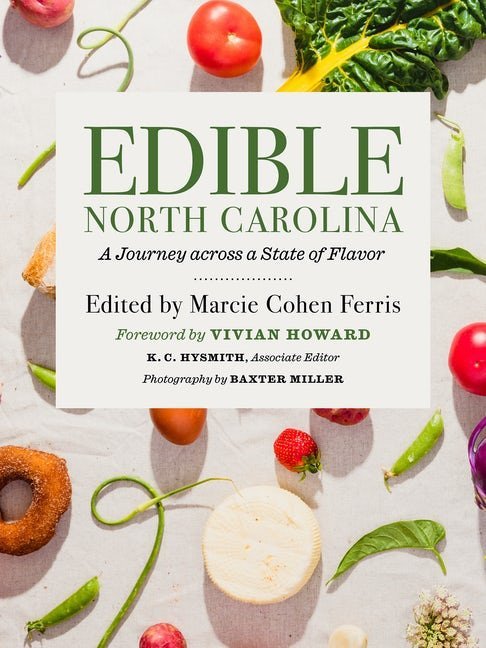Edible North Carolina edited by Marcie Cohen Ferris
The group met in January to discuss this revealing collection of essays, photographs and recipes.
The University of North Carolina Press, 2022, www.uncpress.org
The Sustainability Book Club met on January 5 to discuss Edible North Carolina: A Journey across a State of Flavor edited by Marcie Cohen Ferris. The book documents the state’s diverse food landscape from the Outer Banks to the Blue Ridge, with contributions from journalists, farmers, chefs, entrepreneurs, scholars and food activists. Each essay is accompanied by beautiful photos and a recipe designed for the home cook.
In the introduction, Cohen Ferris provides an in-depth look at North Carolina’s food, farming and fishing history, from Indigenous people to today. Twenty essays then take us across the state to learn about different foods and cultures, wrapping up with a call to action from Cohen Ferris.
A few interesting points from the book:
“Know your fishermen” initiatives and “local catch” programs inspired by the farm-to-table movement are educating consumers about local, seasonal seafood options.
Casual barbecue restaurants, which have traditionally used commodity pork to prepare inexpensive menu items, have largely been left out of the “eat local” conversation. Creative restaurateurs, however, are finding ways to make serving pasture-raised pork cost-effective, often by using all parts of the animal in unique dishes.
Charlotte’s immigrant-owned food businesses, a number of which are near Central Avenue, offer opportunities to explore global flavors, such as Bosnian cevapi, Middle Eastern schawarma, Ethiopian spices and Vietnamese sandwiches.
A collard sandwich recipe shared by Malinda Maynor Lowery of the Lumbee Tribe features ribbons of bright green, barely wilted collard greens served between two pieces of crisp, golden cornbread.
Key takeaways:
Examining the history of food, farming and fishing in North Carolina can help us better understand the food landscape we encounter today.
Local food remains out of reach for most North Carolinians due to cost and geography. In addition, the state has the tenth highest rate of food insecurity in the nation. Hunger-relief organizations, food hubs, mobile markets, community gardens and other collaborative programs are responding to this need.
The contemporary food movement is working toward interconnected regional food economies and a sustainable food infrastructure that links small farms and fisheries with rural and urban people. Issues to address include land reform, salary equity, fair and safe working conditions, empowerment of women and people of color, animal welfare, environmental stewardship, and community access to affordable, local, seasonal food.
If you love local food, be sure to pick up a copy of this informative and thought-provoking book. In the words of one book club member, “The introduction alone was a great history and overview of North Carolina’s foods. Keep it on your shelf.”
The Sustainability Book Club
Join a group of avid readers who meet monthly to engage in lively discussions focused on books about sustainability. The club meets at 6:30 p.m. on the first Thursday of every month on Zoom. Contact us to join!
February 2: An Immense World: How Animal Senses Reveal the Hidden Realms Around Us by Ed Yong
March 2: Mini-Forest Revolution: Using the Miyawaki Method to Rapidly Rewild the World by Hannah Lewis
April 6: Saving the Wild South: The Fight for Native Plants on the Brink of Extinction by Georgann Eubanks
May 4: Fen, Bog and Swamp: A Short History of Peatland Destruction and Its Role in the Climate Crisis by Annie Proulx

